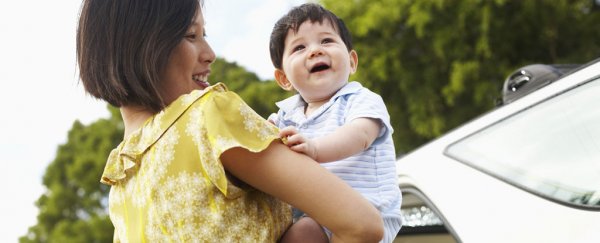Numerous studies point to the benefits of speaking more than one language, with research showing that bilingual adults have a higher volume of grey matter and could recover more easily from brain injuries.
Scientists have also found that the positive effects of bilingualism can be seen in young children, but a new study suggests that the benefits of exposing a person to more than one language can be seen even when we're just a few months old.
"Our results suggest that before they even start talking, babies raised in bilingual households are getting practice at tasks related to executive function," said neuroscientist Naja Ferjan Ramírez from the University of Washington. "This suggests that bilingualism shapes not only language development, but also cognitive development more generally."
According to the researchers, just as babies are about to turn 1 year old and start speaking themselves, they begin to make a change in how they process the sounds of spoken words, and this is where being raised in a bilingual household can be an advantage.
"Monolingual babies show a narrowing in their perception of sounds at about 11 months of age – they no longer discriminate foreign-language sounds they successfully discriminated at six months of age," said one of the team, Patricia Kuhl. "But babies raised listening to two languages seem to stay 'open' to the sounds of novel languages longer than their monolingual peers, which is a good and highly adaptive thing for their brains to do."
The findings, published in Developmental Science, are based on observations made of 16 11-month-old babies who took part in the experiment. Eight of the babies came from families where English was the only language spoken, whereas the remaining eight came from Spanish-English households.
The scientists used magnetoencephalography (MEG) imaging to monitor the babies' brain activity as they listened to an 18-minute stream of speech sounds specific to either English or Spanish, or common to both.
The team found that when listening to the audio, the bilingual babies showed stronger responses in their prefrontal and orbitofrontal cortices – regions of the brain associated with things like cognitive processing and decision making.
Interestingly, the researchers found that the bilingual babies displayed neural sensitivity to both English and Spanish sounds, suggesting they were indeed learning both languages.
Also, the monolingual babies weren't any more sensitive to English than the bilingual babies, meaning the cognitive burden of being exposed to two languages wasn't slowing the bilinguals' learning rates, despite the double whammy.
While the findings will need to be confirmed in a larger study with more babies, they could come as a relief to bilingual parents concerned that 'overexposing' their children to two languages might hamper their learning.
"The 11-month-old baby brain is learning whatever language or languages are present in the environment and is equally capable of learning two languages as it is of learning one language," said Ferjan Ramírez. "Our results underscore the notion that not only are very young children capable of learning multiple languages, but that early childhood is the optimum time for them to begin."
